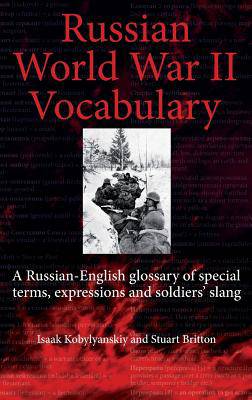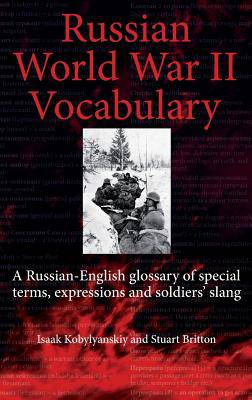
- Retrait gratuit dans votre magasin Club
- 7.000.000 titres dans notre catalogue
- Payer en toute sécurité
- Toujours un magasin près de chez vous
- Retrait gratuit dans votre magasin Club
- 7.000.000 titres dans notre catalogue
- Payer en toute sécurité
- Toujours un magasin près de chez vous
Russian World War II Dictionary
A Russian-English Glossary of Special Terms, Expressions and Soldiers' Slang
Stuart Britton, Isaak Kobylyanskiy
Livre relié | Anglais
69,95 €
+ 139 points
Description
The Great Patriotic War (GPW) of the Soviet people against Nazi Germany, known in the West as the Eastern Front of WWII, continues to attract a number of military historians from different countries around the world. The frontline veterans' reminiscences occupy a prominent place among most important documents of that time. In contrast to official documents, these recollections reproduce the so-called truth of the foxholes, the genuine spirit of the war. Along with their honesty, the WWII veterans' reminiscences are full of idiomatic expressions, specialized terms and abbreviations peculiar to that war. Regardless of their language, the memoirs reproduce the wartime vocabulary of the authors' nationalities, and reading them can be a difficult task for uninformed readers. Consequently, special dictionaries appeared in print and later on Internet web sites. Unlike most of the Allied countries, no war jargon/slang dictionary has been published in Russia. This glossary is intended to begin to fill that gap. Several sources of the Red Army serviceman's slang were peculiar to the Soviet experience. The upheaval of the 1917 October Revolution and following Civil War, and the fundamental changes wrought by the political and social reforms and campaigns in the 1920s-1930s affected the Russian vocabulary substantially. The fact that the overwhelming majority of Red Army soldiers and officers came from rural households, and brought their local idioms and expressions into the trenches, also enriched the war vocabulary. Another set of figurative expressions arose because of Stalin's terrible purges of the 1930s, when people created euphemisms to avoid saying words like search, arrest and execution. Such expressions came into general circulation and contributed to Russian wartime slang. Some words also appeared under the harsh conditions of the USSR far rear, where civilians struggled under conditions of hard labor and malnutrition. Lend-lease items entered the soldiers' parlance, often in the form of nicknames. Finally, any army has its traditions and slogans, many of which were revived in the Red Army during WW II. All of the aforementioned sources and others contributed to the Russian wartime vocabulary. The authors began this glossary as a translators' aid, but now they believe it will also be of interest to military historians and linguists who work with original Russian military sources, especially of the Second World War period.
Spécifications
Parties prenantes
- Auteur(s) :
- Editeur:
Contenu
- Nombre de pages :
- 76
- Langue:
- Anglais
Caractéristiques
- EAN:
- 9781909384064
- Date de parution :
- 19-07-13
- Format:
- Livre relié
- Format numérique:
- Genaaid
- Dimensions :
- 152 mm x 229 mm
- Poids :
- 272 g







